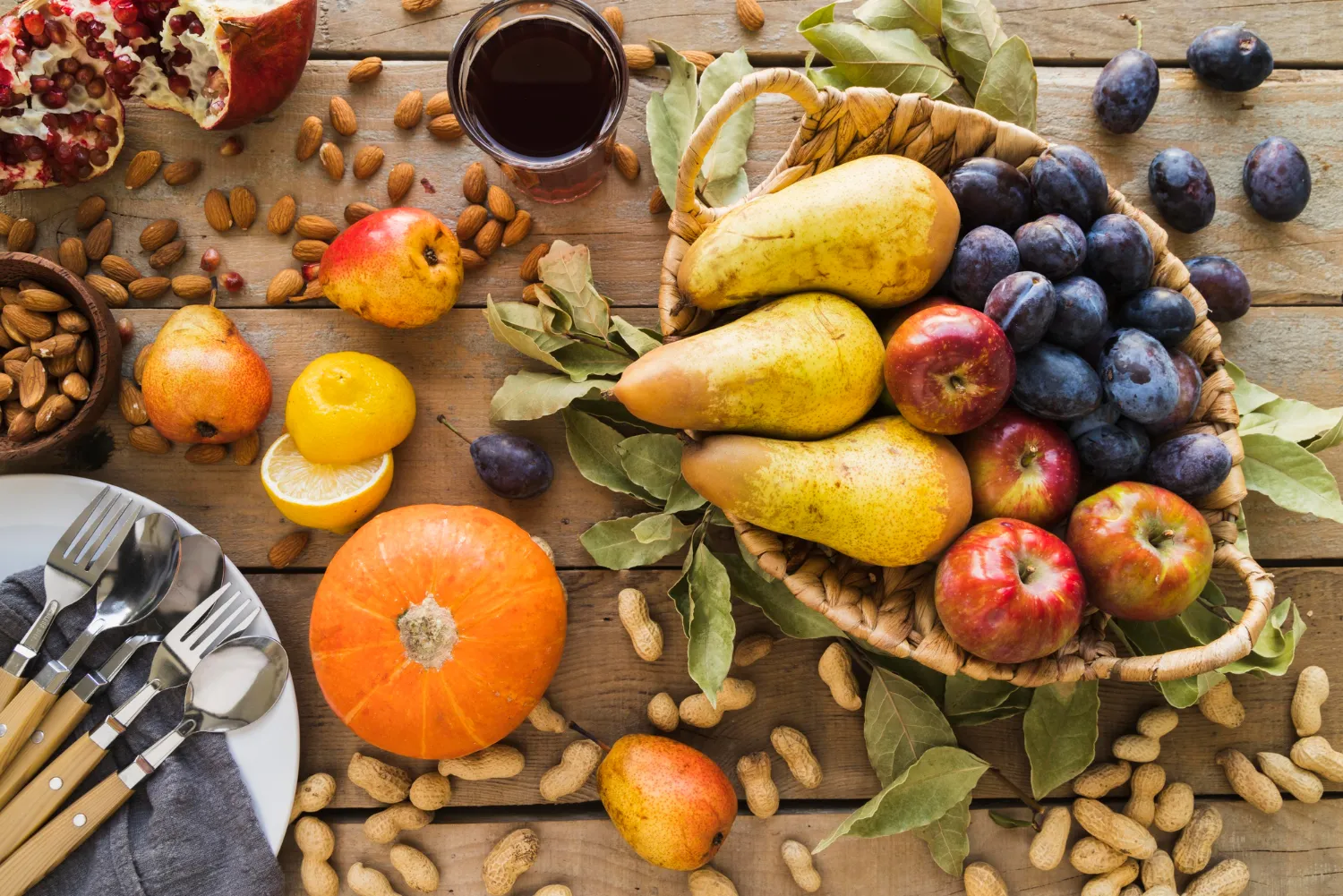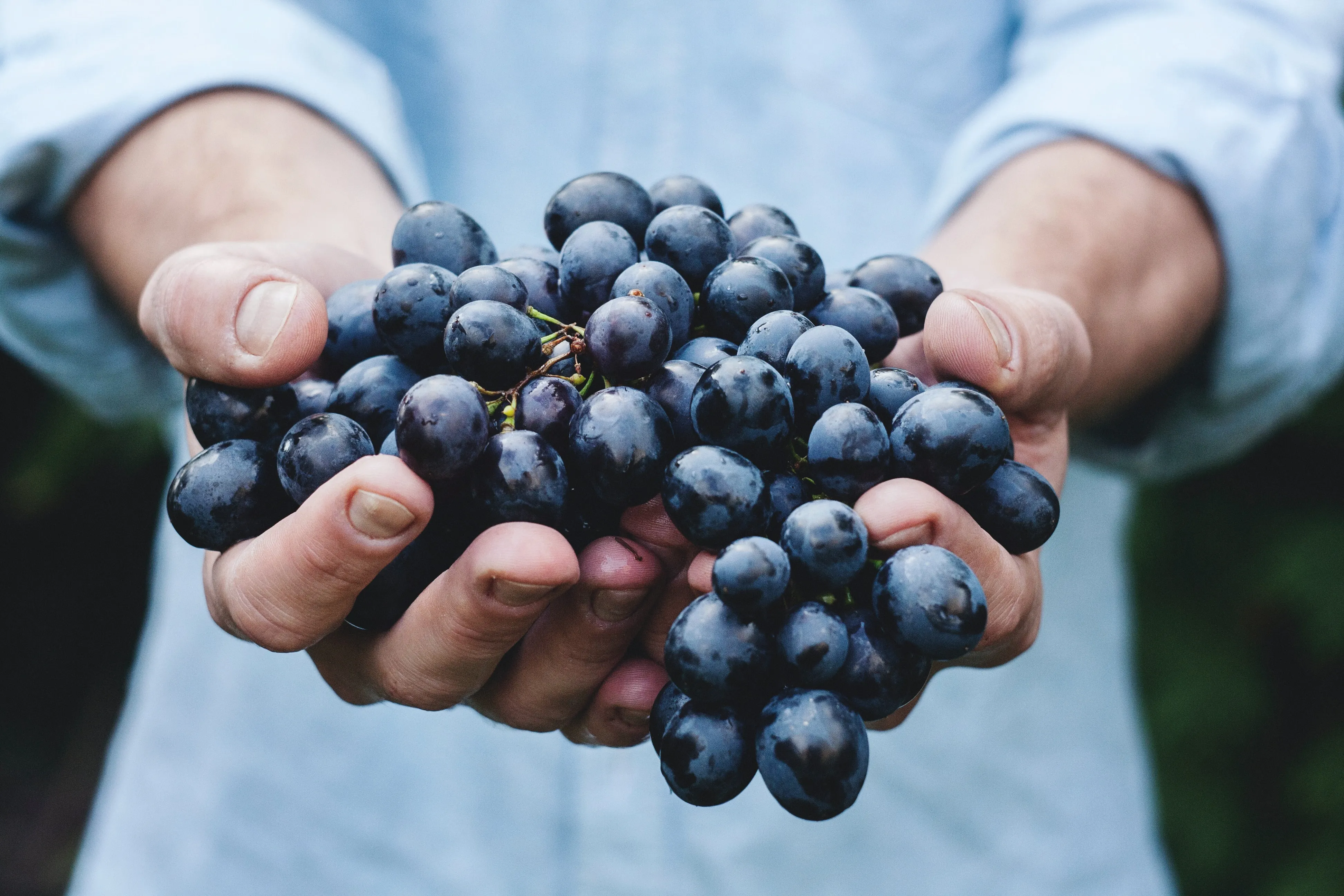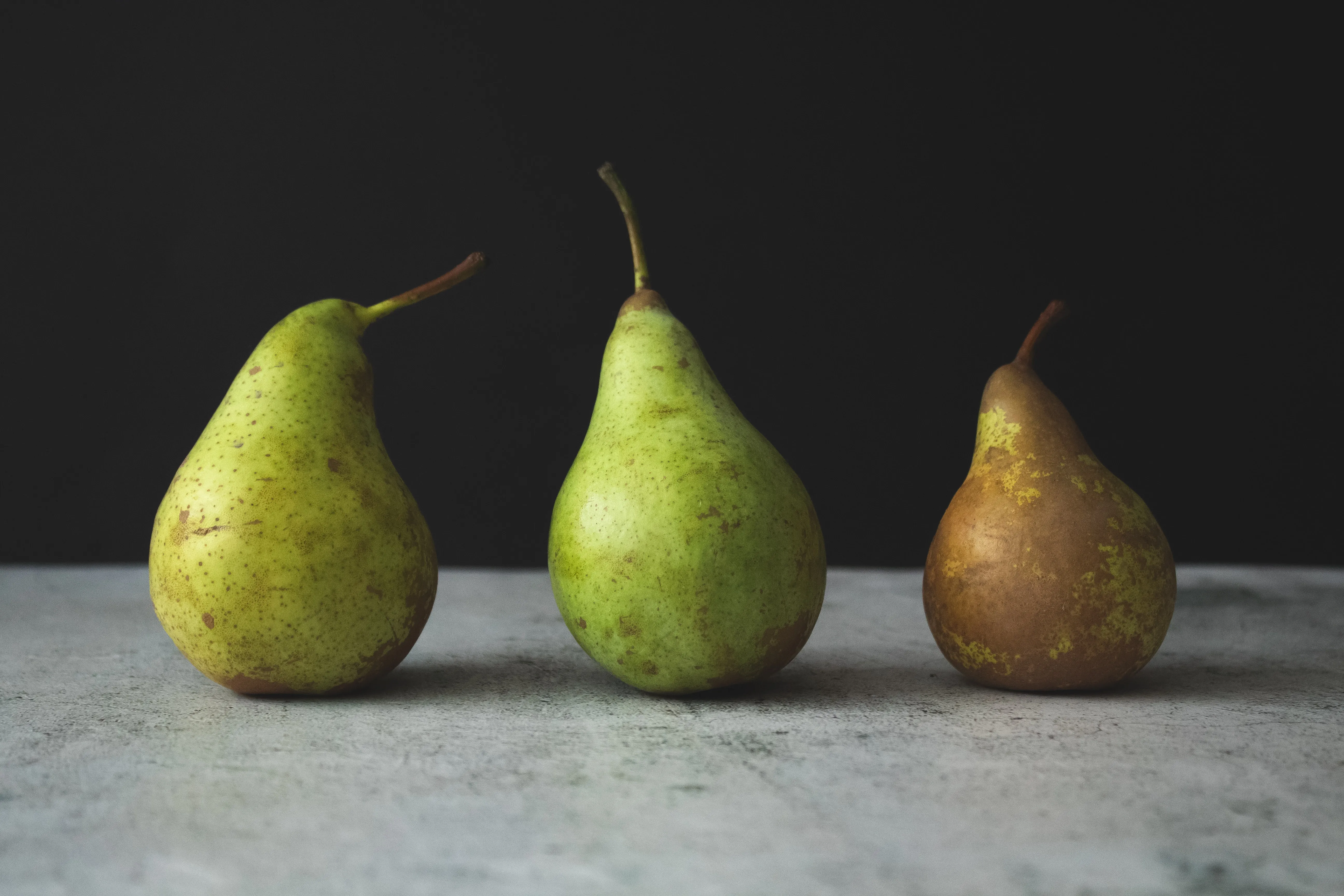The Sweet Truth
Sugar, Autumn, and Midlife

[Toc]
As the crisp air of autumn envelops us, it's hard to resist the allure of seasonal sweets. But for women over 45, understanding sugars is more than just a matter of indulgence - it's a key to vibrant health and balanced living. It's about nourishing our bodies in harmony with the rhythm of the seasons, a practice that not only benefits our well-being but also treads gently on the earth. In this post, we will look at natural sugars as these are key to optimal health.
Unmasking Sugar Myths
In our quest for wellness, sugar often gets a bad rap. It's time to dispel the myth that all sugars are created equal. Natural sugars, found in fruits and whole foods, are your body's allies, providing essential nutrients and sustained energy. Refined sugars, on the other hand, are the villains, offering empty calories devoid of any real benefit.
Take this simple test and swap a candy bar for a handful of mixed nuts and dried fruits. Expect your energy levels to stabilize, and that mid-afternoon slump becomes a distant memory.
Why Your Body Needs Sugar
Your body craves sugar for a reason - it needs it! Sugars are the fuel that powers your every move, from chasing after grandchildren to pursuing your passions. More importantly, they're the secret behind a balanced mood and a sharp mind.
When we talk about sugars, we're not just referring to the sweet stuff in your morning coffee. We're talking about the complex carbohydrates in hearty grains, the fructose in succulent fruits, and the glucose that revs up your brain cells. Without them, we'd be running on empty.

Deciphering Good vs. Bad Sugars
The key is to be discerning. Complex carbohydrates in whole grains like brown rice and quinoa release their energy slowly, providing a steady stream of vitality. Simple sugars, as in that sugary cereal, or candy, give you a quick burst followed by a crash.
Here's where it gets exciting. You can swap that soda for a refreshing glass of infused water with slices of citrus and a sprig of mint. Suddenly, you're hydrating and nourishing your body, all while avoiding that sugar spike and subsequent slump.
Seasonal Sugar Abundance
Autumn is a treasure trove of nutrient-dense sweet delights. Nature provides an abundance of natural seasonal sugars within the plants for a variety of evolutionary and ecological reasons:
Energy Reserves for Winter: In many parts of the world, winter brings a scarcity of food resources. Plants produce and store sugars in their fruits as a way to provide energy for their own survival and reproduction during the colder months. Animals, including humans, rely on these sugars as a concentrated source of energy to prepare for winter.
Seed Dispersal: Fruits are the means by which many plants disperse their seeds. The sugars in fruits are a powerful attractant for animals. When animals eat the fruit, they disperse the seeds through their droppings just in time before the ground hardens with frost and snow. This dispersal strategy increases the chances of a plant's seeds finding a suitable environment for germination.
Temperature Regulation: In colder climates, the natural sugars in fruits serve as a form of antifreeze. By lowering the freezing point of the water inside the cells, the sugars help protect the plant from frost damage, allowing it to continue photosynthesis even as temperatures drop.

Optimal Growing Conditions: The conditions in autumn, such as warm days and cool nights, are often ideal for fruit ripening. This allows plants to accumulate sugars and other nutrients before the onset of winter.
Ecosystem Health: Natural sugars provide crucial nutrients not only to humans but also to a wide range of animals, including insects, birds, and mammals. This supports the overall health and balance of ecosystems.
Survival of the Fittest: Plants that produce fruits with appealing flavors and high sugar content have an evolutionary advantage. Animals are more likely to consume and disperse the seeds of these plants, ensuring their genetic legacy.
Symbiotic Relationships: Many animals and birds depend on fruits for sustenance during autumn. By providing a ready source of nutrition, plants foster mutually beneficial relationships with these creatures.
Benefits to Our Bodies
Natural sugars, found in fruits, vegetables, and whole foods, offer a range of benefits for the human body. It's important to note that while natural sugars offer numerous benefits, moderation is key. Eating a variety of fruits and vegetables in their whole, unprocessed forms is the best way to enjoy their benefits while maintaining a balanced diet:
Sustained Energy: Natural sugars provide a steady supply of energy due to their complex carbohydrate composition. Unlike refined sugars that cause rapid spikes and crashes in blood sugar levels, natural sugars release their energy slowly, offering a sustained source of vitality.
Nutrient Density: Fruits and vegetables are not just sources of sugar; they are also packed with essential nutrients like vitamins, minerals, fiber, and antioxidants. These nutrients support various bodily functions, including immune function, digestion, and cellular repair.
Fiber Content: Natural sugars come bundled with dietary fiber. Fiber aids in digestion helps regulate blood sugar levels, and promotes a feeling of fullness, reducing overeating.
Balanced Mood and Cognitive Function: The brain relies heavily on glucose (a form of sugar) for optimal functioning. Natural sugars provide a steady supply of glucose, which supports cognitive functions like concentration, memory, and mood regulation.

Improved Digestive Health: The fiber in fruits and vegetables promotes healthy digestion by preventing constipation and supporting a diverse and thriving gut microbiome.
Antioxidant Properties: Many fruits and vegetables contain antioxidants, which help protect cells from damage caused by free radicals. This can lower the risk of chronic diseases and slow the aging process.
Support for the Immune System: Vitamins and minerals found in natural sugars, such as vitamin C and zinc, play crucial roles in supporting a robust immune system.
Heart Health: Potassium-rich foods, like bananas, help regulate blood pressure. Additionally, the fiber and antioxidants in fruits and vegetables contribute to heart health by reducing cholesterol levels and supporting overall cardiovascular function.
Weight Management: Due to their high fiber content, natural sugars can help control appetite and contribute to a feeling of fullness. This can lead to reduced calorie intake and support weight management efforts.
Hydration: Many fruits have a high water content, which contributes to overall hydration. Proper hydration is essential for various bodily functions, including temperature regulation and waste elimination.
Improved Skin Health: Vitamins and antioxidants found in fruits and vegetables contribute to healthy, glowing skin by supporting collagen production and protecting against environmental damage.

The Best Autumn Fruits and Vegetables
The vibrant hues of pumpkins, sweet potatoes, and cranberries signal not only the changing of leaves but also a rich source of vitamins, antioxidants, and fiber. Understanding the seasonal availability of natural sugars helps us make informed dietary choices and appreciate the intricate interplay between nature and our own well-being.
Here Are Our Top Autumn Favourites:
Apples
They are high in fiber, vitamin C, and various antioxidants. Supports digestive health, boosts immune function, and may help regulate blood sugar levels. An apple a day keeps the doctor away!
Beetroot
Rich in antioxidants, fiber, folate, and potassium. Supports heart health, aids digestion, and may help regulate blood pressure. Make beetroot and ginger shots, grate raw onto salads, roast whole in the oven, or add to soups.
Butter Lettuce
High in vitamins A and K, as well as folate. Supports eye health, and bone health, and provides essential nutrients for overall well-being. Salad isn’t popular is not popular in the winter yet a small amount adds crispness and freshness to the diet.
Butternut Squash
Excellent source of vitamin A, vitamin C, fiber, and potassium. Supports immune function, and eye health, and may aid in digestion. Roast sprinkled with seasonal spices or used in soups and stews, this versatile veg deserves to be in your pantry all winter.

Carrots
Rich in beta-carotene, vitamin K, and fiber. Promotes eye health, supports healthy skin, and aids in digestion. Raw as crudities, grated onto salads, added to stir-fries, roasted or boiled carrots always have a place in the weekly menu.
Cauliflower
High in vitamin C, vitamin K, and folate. Supports immune function, and bone health, and provides essential nutrients for overall well-being. You can roast whole covered in herbs, grate into ‘rice’, create cauliflower steaks, or simply steam in florets.
Figs
Rich in fiber, potassium, calcium, and antioxidants. Promote digestive health, support bone density, and provide essential nutrients. Eat raw or baked, or a simple way is to peel, place between two sheets of baking paper, and hit with a heavy pan to create a carpaccio. Place in the freezer for an hour and then peel off the paper, put on a plate, and decorate with bitter greens goat's cheese and balsamic vinegar. Delicious!
Jerusalem Artichokes
High in fiber, potassium, and iron. Supports digestive health, may help regulate blood pressure, and provides essential nutrients. Not from Jerusalem and not an artichoke, they have a unique sweet, and slightly nutty flavor with a hint of artichoke, which is how they acquired their name. This root vegetable can be used in a variety of dishes, including soups, stews, purees, and side dishes. They can be eaten raw in salads or sliced thin for a crunchy texture.
Grapes
Rich in antioxidants, vitamins C and K, and resveratrol. Supports heart health, may boost immune function, and provides essential nutrients. Pop them in your mouth and remember to eat the pips or seeds which contain polyphenols, antioxidants, and a small amount of natural oil.

Kale
High in vitamins A, C, and K, as well as calcium and fiber. Supports immune function, and bone health, and provides essential nutrients. Chop raw into salads, roast in the oven for Kale Chips, or add to soups and stews.
Mushrooms
Good source of B vitamins, selenium, and antioxidants. Supports immune function, provides essential nutrients, and may have anti-inflammatory properties. Eat them for breakfast on a slice of Life Bread or add to a variety of dishes from chicken stuffing to mushroom risotto etc.
Parsnips
Rich in fiber, vitamin C, and potassium. Supports digestive health, boosts immune function, and provides essential nutrients. Use in soups and stews or roast in the oven drizzled with a small amount of olive oil. The high natural sugar content will crisp them quickly.
Pears
High in fiber, vitamin C, and potassium. Supports digestive health, boosts immune function, and provides essential nutrients. Just eat!

Pineapple
Rich in vitamin C, manganese, and bromelain (an enzyme). Supports immune function, aids in digestion, and provides essential nutrients. Pineapple is fabulous for tickly throats, coughs, and colds.
Potatoes
Good source of vitamin C, potassium, and fiber. Supports immune function, provides energy, and offers essential nutrients. The good old potato often gets a bad wrap yet they do not need to be served only as unhealthy chips. Red-skinned potatoes can be baked whole or boiled whole for 45 minutes, cooled, and then squashed with a heavy pan before finishing in an oven drizzled with a little olive oil and salt. Splattered potatoes have become a weekly household favorite.
Pumpkin
High in vitamin A, vitamin C, and fiber. Supports immune function, and eye health, and may aid in digestion. Use it roasted in chunks sprinkle with spices or add to soups and stews. Avoid pumpkin pie recipes that include added sugar, shop-bought pastry, or condensed milk!
Pomegranates
Rich in antioxidants, vitamin C, and potassium. Supports heart health, boosts immune function, and provides essential nutrients. They are fabulous sprinkled over salads, and used in smoothies or Nice Cream (Blitzed frozen banana, pomegranate, and a touch of cardamom spice).

Sweet Potatoes
Excellent source of vitamin A, vitamin C, and fiber. Supports immune function, and eye health, and provides essential nutrients. Baked whole and served with coleslaw or chili sin carne, added to stews and soups, or made into fries/chips, you cannot go wrong with this vegetable.
The Sweet Truth
Let's embrace the sweet truth and savor the sugars that nourish and uplift us while steering clear of the ones that leave us drained and wanting. We can revel in the seasonal bounty that nature so generously provides, celebrating both our health and the beauty of autumn.
Remember, it's not about deprivation; it's about mindful choices that lead to a life lived sensibly and selfishly, with vitality and joy.









